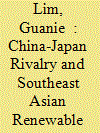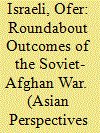|
|
|
Sort Order |
|
|
|
Items / Page
|
|
|
|
|
|
|
| Srl | Item |
| 1 |
ID:
185235


|
|
|
|
|
| Summary/Abstract |
In recent years, China and Japan have increasingly competed against each other over infrastructure provision in Southeast Asia, their near abroad. Through an analysis of energy infrastructure provision in Indonesia, this article argues that Indonesia has benefited from Chinese and Japanese financial resources in providing energy to otherwise remote and isolated communities. However, Indonesia’s domestic interest groups and its political economic structure have promoted nonrenewable energy adoption at the expense of renewable sources. Indeed, Indonesia’s demand for nonrenewable energy has opened up opportunities for both Chinese and Japanese firms. While Chinese firms have definitively grown their market share in nonrenewable energy infrastructure, especially coal-fired power plants, so too have their Japanese counterparts. The emphasis on coal-fired power has not only hindered renewable energy expansion, but also led to ecological damage. Furthermore, several Indonesian private firms with long-standing interests in coal mining and processing have forged collaborative ties with the Chinese and Japanese firms to enter the business of operating coal-fired power plants, while securing a captive market for their coal supplies. These findings illustrate that China-Japan competition is more complex than commonly portrayed, in addition to raising questions about Chinese and Japanese claims of a “green” Belt and Road Initiative and Partnership for Quality Infrastructure, respectively.
|
|
|
|
|
|
|
|
|
|
|
|
|
|
|
|
| 2 |
ID:
185236


|
|
|
|
|
| Summary/Abstract |
To secure an oil and gas supply, China has built several types of energy infrastructure near its borders and developed energy cooperation with regional partners based on this infrastructure. However, not all energy cooperation projects develop at an equal pace or are equally successful. This study employs the neofunctionalist spillover hypothesis—one of several key discourses applied to explaining European integration—to account for the difference in regional cooperation between two China-driven energy megaprojects in Asia: the China–Central Asia Pipelines and the China–Southeast Asia Pipelines. After investigation into the so-called spillover hypothesis, including “functional spillover,” “political spill-over,” and “cultivated spillover,” the more successful of the two projects was also found to be more significant in terms of its spillover effect. Thus, this article finds that regional cooperation in the Chinese context also supports the spill-over hypothesis, which has conventionally been regarded as a Europe-based discourse.
|
|
|
|
|
|
|
|
|
|
|
|
|
|
|
|
| 3 |
ID:
185233


|
|
|
|
|
| Summary/Abstract |
The contemporary US/Japan-Chinese rivalry and tension around dam building in the Mekong region is often mistakenly seen as the US and Japan’s reactive response to recently growing Chinese diplomatic and economic influence in the region. In fact, the United States and Japan have been critical architects of institutional and financial engineering for hydropower development in the Mekong region, which predates involvement by the People’s Republic of China (PRC). The factors and dynamics involved in significant lending regime shifts away from a liberal hydropower finance regime to an export credit driven model premised on Asian economic statecraft is an understudied topic. This article fills part of this gap through a case study of evolving hydro-financing regimes in Lao PDR from the 1970s to the present. The study draws on extensive ethnographic work in Laos, Japan, Thailand, and the United States with local and external political elites, hydro-financing technocrats, and business actors and gains additional insights from analysis of primary firm, institutional, and government documents. The article finds that the role of economic crises and their impact on the relative economic power of hydropower financing regimes as well as their ideational impact on borrower regimes are significant in explaining shifting patterns in lending regime dominance.
|
|
|
|
|
|
|
|
|
|
|
|
|
|
|
|
| 4 |
ID:
185238


|
|
|
|
|
| Summary/Abstract |
This article explores the correlation between media effects and political trust, as well as the moderating factor in the equation. Specifically, the authors measured political trust within two categories: institutional trust and system trust. Analyses were based on two waves of surveys conducted among Internet users (2014: N = 2,970; 2017: N = 2,379) in China. Results indicated that (1) exposure to official media was positively correlated with political trust, whereas exposure to individual media and overseas media were negatively correlated with political trust, and exposure to commercial media was a nonsignificant factor; (2) correlation was higher for institutional trust than system trust; and (3) political values were a significant moderating factor. Implications are discussed.
|
|
|
|
|
|
|
|
|
|
|
|
|
|
|
|
| 5 |
ID:
185234


|
|
|
|
|
| Summary/Abstract |
Despite growing concerns about the impacts of climate change, Japanese public financial institutions continued to build on long-standing partnerships in Southeast Asia through the expansion of thermal power generation. Recent Japanese investments include coal-fired power plants in Indonesia and Vietnam and natural gas supply chains in Indonesia and Bangladesh. Japan was one of the last developed countries globally to champion coal development that, even if highly efficient, comes at a cost to the environment. Overseas energy investment is at the nexus of two significant challenges of this century: the threat of climate change and great power competition. Japan, regionally proximate to China and burdened with a shrinking economy and limited energy supplies, shapes its regional foreign policy to enhance energy security, expand overseas market share, and uphold a rules-based international order. This paper discusses these primary drivers of Japan’s policy approach and highlights examples of Japan’s overseas energy investment strategies starting to shift to maintain a competitive edge as public opinion and market forces react to the increased risk perception of climate change.
|
|
|
|
|
|
|
|
|
|
|
|
|
|
|
|
| 6 |
ID:
185231


|
|
|
|
|
| Summary/Abstract |
This paper demonstrates that when a superpower within a bipolar system fights against a small rival either that is located beyond its sphere of influence or that has geostrategic importance to the other acting superpower, other forces matter more than the distribution of capabilities between the belligerents. Within the study I review two primary explanations for the Soviet withdrawal from Afghanistan. Despite the strong resistance of local forces to the Soviet presence in Afghanistan, mainly by the Afghan Mujahedeen, Moscow failed to predict the political outcomes of the war. It was in fact a series of negative feedbacks that caused Soviet withdrawal from Afghanistan after a decade-long intervention that did not achieve any political goals. One such example was the direct strike against the Soviet presence in Afghanistan, launched and coordinated by the United States as the other acting superpower under the bipolar system of that time.
|
|
|
|
|
|
|
|
|
|
|
|
|
|
|
|
| 7 |
ID:
185232


|
|
|
|
|
| Summary/Abstract |
This article examines the evolution of China-ASEAN environmental and energy cooperation since the 2010s with a focus on changes following the launch of the Belt and Road Initiative (BRI). It shows that over the past decade China and ASEAN have actively expanded cooperative frameworks and mechanisms in the domain of environmental protection as part of their comprehensive approach to sustainable development, particularly regarding energy projects. Nonetheless, the implementation record in their energy cooperation, that is, the lion’s share of BRI projects in Southeast Asia, remains unsustainable and contradicts with their shared “green” policy discourse. The article examines factors from both sides of China and ASEAN that contribute to this disconnect and explains why China’s own accomplishments in renewable energy development fail to spill over to Southeast Asia. These findings have implications for China’s impact on global governance and its leadership role in the Global South.
|
|
|
|
|
|
|
|
|
|
|
|
|
|
|
|
| 8 |
ID:
185239


|
|
|
|
|
| Summary/Abstract |
WE LIVE IN A TIME OF ASTONISHING SOCIAL CHANGE, AS THE COVID-19 pandemic has taught us. I would like to comment on three fundamental changes in the world of nuclear power and nuclear weapons. The first of these is the ratification of the Treaty on the Prohibition of Nuclear Weapons (TPNW) on January 22, 2021 (United Nations 2017). The second is evidence from the Greenpeace study in March that the decommissioning of the Fukushima Daiichi Nuclear Power Plant is not possible within a reasonable time frame or cost (Sato 2021). The third is the publication of the Carnegie Endowment analysis of the impact of cyber interventions on strategic nuclear war calculations (Levite et al. 2021).
|
|
|
|
|
|
|
|
|
|
|
|
|
|
|
|
|
|
|
|
|